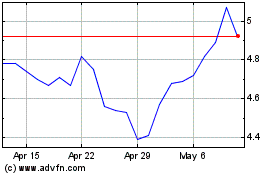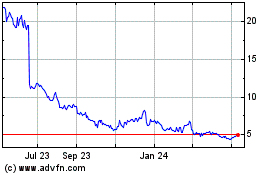Gene Therapy for Visually Impaired Shows Promise
October 05 2015 - 6:10PM
Dow Jones News
Biotechnology startup Spark Therapeutics Inc. said its
experimental gene therapy improved vision among patients with
hereditary vision impairment in a clinical trial, without the
serious safety problems that have dogged the emerging field of gene
therapy in the past.
The Philadelphia-based company announced the results in a news
release, with few details. Spark says additional data will be
presented at a medical meeting in Paris on Oct. 10.
Spark said it plans to seek U.S. Food and Drug Administration
approval to market its treatment next year, which could make it the
first gene therapy to reach the U.S. market if regulators approve
it for sale. Spark's shares closed 21% higher at $53.02 Monday.
Gene therapy involves the injection of genetic material into a
person's cells to treat or prevent a disease. The research stalled
after some study participants died or developed cancer after
receiving gene therapies in the late 1990s and 2000s.
But gene therapy is gaining ground again. In 2012, the European
Commission approved the Western world's first gene therapy, UniQure
NV's Glybera, for the treatment of patients with a rare enzyme
deficiency. The therapy hasn't been approved for sale in the
U.S.
Other companies including Bluebird Bio Inc. are developing gene
therapies for various diseases.
Spark's therapy, SPK-RPE65, targets mutations in a gene known as
RPE65, which can cause visual impairments including loss of night-
and peripheral-vision; the conditions can progress toward complete
blindness. Spark's therapy contains a copy of a functional RPE65
gene that is encapsulated in a type of virus stripped of its viral
DNA. The virus acts as a delivery vessel for the gene, and is
injected into the eyes.
The study tested the therapy in 19 people with confirmed RPE65
gene mutations and compared their outcomes with nine patients who
didn't receive the therapy.
To track outcomes, researchers had patients walk through indoor
obstacle courses with varying levels of lighting, Spark Chief
Executive Jeffrey D. Marrazzo said in an interview.
Researchers videotaped the participants to track whether they
could navigate the obstacle courses relying on their vision. Spark
said patients receiving the therapy had improved "functional
vision" in the year following the treatment, compared with the
control group.
Patients receiving the therapy also experienced improved
sensitivity to light versus the control group, but there was no
statistically significant difference in "visual acuity" between
patient groups. Visual acuity is measured by the ability to read
letters or numbers at a set distance.
Spark said there were no serious side effects attributable to
the therapy. There were side effects related to the procedure to
inject the therapy, such as eye inflammation and elevated
intraocular pressure.
Debra Thompson, professor of ophthalmology and visual sciences
at the University of Michigan's Kellogg Eye Center, said the Spark
study appears to be significant.
"We've all been hoping gene therapy will be approved for
treating these retinal disorders, and to see the first example of
that getting very close is exciting," said Dr. Thompson, who has
conducted research on hereditary retinal disorders but wasn't
involved in Spark's studies.
While Spark announcement didn't quantify the visual improvements
among patients, she said "even small gains in visual function can
make a huge difference in quality of life."
Spark Therapeutics was spun out of Children's Hospital of
Philadelphia in 2013 based on research conducted at the hospital.
The company, which now has about 90 employees, had its initial
public stock offering in January 2015.
Glybera—the only gene therapy currently on the market in the
Western world—costs about $49,000 per vial, or $930,000 total for
the amount the average patient would need, according to Chiesi
Farmaceutici SpA, UniQuire's marketing partner for the drug. This
has raised concerns about the affordability of gene therapy. Chiesi
says it is a breakthrough treatment that is given only once and has
a long-lasting effect.
Spark hasn't said how much it would charge for its therapy if it
makes it to market.
Write to Peter Loftus at peter.loftus@wsj.com
Subscribe to WSJ: http://online.wsj.com?mod=djnwires
(END) Dow Jones Newswires
October 05, 2015 18:55 ET (22:55 GMT)
Copyright (c) 2015 Dow Jones & Company, Inc.
uniQure NV (NASDAQ:QURE)
Historical Stock Chart
From Mar 2024 to Apr 2024

uniQure NV (NASDAQ:QURE)
Historical Stock Chart
From Apr 2023 to Apr 2024
